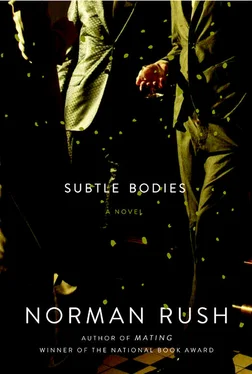Abruptly, Gruen sat down. He said something about steam, and tea. Ned tried to think of what he could do. Upstairs in the study there had been a niche with a mini-kitchen built into it — no stove, but a midget microwave oven. And he had noticed a box of Earl Grey in the vicinity. He would take care of it in a minute.
Gruen was fishing around in his wrappings. He said, “I brought this,” handing Ned a milky Polaroid photograph. Ned studied it. There they were, their group circa 1974 when they’d lived together off campus on the Lower East Side at 71 Second Avenue. He remembered the super taking this picture, organizing them in the widest part of their railroad apartment, the dining ell. There they were, sitting in disparate kitchen chairs, facing the future. Ned had worn his hair longer, then: the wavy front rose up in a way that now reminded him of bleachers. Douglas was the only one presenting in profile, very Apollonian, except for his unusually prominent Adam’s apple. A spatula was protruding from the breast pocket of Douglas’s tweed jacket, for no reason. It was not meant to suggest that Douglas was connected to any cooking duties. Joris had his hands on his knees and was leaning forward in a crouch, scowling balefully. Gruen was staring into the bowl of a Meerschaum pipe, seemingly perplexed, being a clown. There was at least one other dumb group shot, as he recalled. In it, Douglas, in bathing trunks, was aiming a hand mirror at his navel and Elliot was smirking into the inside pages of a gag New York Times they had had printed up at a novelty shop, whose headline was, in forty-eight-point type, SEA GIVES UP ITS DEAD. What dumb jape he himself had been engaged in for the camera he didn’t remember. The group portrait in his hand would, in the ultimate dimness, be all there was of the five of them as an organism.
Gruen told Ned he could have the photo. Ned didn’t want it.
“You keep it,” Ned said to Gruen, who shook his head. Ned put the photo in the pocket containing the Vivaldi CD.
Not going over to present himself to Iva at the main house was beginning to seem idiotic. And he hadn’t seen Hume, except fleetingly, if in fact that had been Hume. True, he was deferring to the strong, what? Requests or instructions of an old friend. He could put it off a little longer, he guessed, without seeming rude. He was going to try Nina again. And when Joris turned up, they would go over together, unless Joris could provide a good reason to obey Elliot. Ned was upset with Elliot.
Gruen was lying down again, again shrouded to the top of his head. Ned decided to erect a card table at a considerate distance from Gruen. Ned had brought him a cup of tea. He retrieved the empty cup from inside the blanket cave Gruen was keeping himself in. Nina continued to not answer.
Ned opened up four folding chairs and placed them around the card table. Earlier, he had located the thermostat. He was satisfied that the baseboard heating strip was functioning. His cardigan would be adequate for warmth. He had laid out his petitions and some ancillary paperwork on the table. For light, there was a floor lamp and a ruby-red pillar candle on a dinner plate. Joris would have book matches or a lighter. So would Elliot, but where was he when you needed him?
He settled himself. Company! he thought. He was hearing definite sounds of arrival, followed by sounds of ascent.
Joris looked joyful, seeing Ned. He sprang into the room from the top step and ran over to Ned and stood there with his arms spread wide, gesturing with his hands for Ned to stand up and endure what would be a crushing hug. So Ned did, full of happiness himself. Joris was the least changed. Or maybe they were in a tie. Joris had all his hair, solidly gray, dense as ever, cropped short. He and Ned were the same height, but Joris was powerfully built. He had heavy brows, a hard face generally. He had a low blink rate that Douglas had observed and proved to him. He did project a kind of Teutonic severity, which had led to Douglas referring to him just once as the Hun. His background was Latvian.
Joris ducked into the half-bath and closed the door. They had yet to get to the death that brought them all there. Ned waited. Joris was the smartest of them. He had gone from mathematics to maritime law, he had had the darkest worldview available then. Joris came out of the half-bath. Somewhere he had found a bottle of Evian water and two tumblers, which he brought to the table. “It’s warm,” he said, indicating the bottled water.
“That doesn’t matter,” Ned said.
“Should we talk quietly?” Joris asked, pointing his chin at Gruen.
“I’m awake,” Gruen said.
“Then you should get up,” Joris said.
“I’ll get up for dinner.”
Joris said something unfathomable to Ned. It was definitely a word. He had said it in his throat. Joris had been raised speaking Latvian at home and English at school. His mother had gone deaf when he was young. For Joris, speaking English seemed a little effortful. Often he gave the impression he was concentrating what he needed to say into pellets, which he delivered after longish intervals. Wait, no, it wasn’t his mother who had gone deaf, it was his father. He’d gone deaf working in the quarry he owned. He was like the king of a rainy country: own a veritable gold mine of a quarry, work it, work in it, get prosperous, go deaf.
Ned and Joris gripped hands across the table, elbows on the tabletop, as though they were going to arm-wrestle. “I concede,” Ned said. It was the way many discussions between them had ended.
“So, you bastard, you came. Hello,” Joris said.
They talked sadly about the freakishness and unfairness of Douglas’s fate. All of them were going to be saying the same things over and over to one another. Douglas had been a man attentive to what he ate, hyperattentive. He had taken care of himself.
Closing the topic for the moment, Ned said, “The group is finished.”
“No,” Joris said, in a voice loud enough to cause Gruen to thrust his head back into the room. “It was finished long ago .”
“What?” Gruen asked.
Ned said, “He doesn’t mean dead from the beginning.” He looked at Joris, who hesitated but finally said what Ned wanted to hear, “No, nono.”
“What were we, nineteen seventy-four to nineteen seventy-eight, the five of us?” Ned asked generally.
Joris closed his eyes. He was considering.
Ned had his own private image of that time. He saw himself looking back, down a very long road, at night, and seeing dimly lighted establishments spaced along the road — but at one point, far back, a gathering of bright lights something like an arcade or a carnival, red and gold lights and shreds of music coming from that location only. It was cheap.
“Look at me, I’m emotional,” Joris said. He was going to say more. Ned knew it was a sign that Joris was ready to give his finished opinion when he took his glasses out of his shirt pocket and laid them down in front of him, as he was doing.
Joris said, “What we were … well, I could quote from when we discussed this on the phone a few years ago: I said we were a cult, but not exactly a cult, a cult of friendship. We got the whole idea of it from Douglas. Without it, we would have made ordinary connections like everybody else does passing through college and not noticed anything particular about that. And some of us might not have made any connections at all. I am not naming names …”
Ned knew enough about Joris’s life to provide a base of real sympathy. They had been in contact through letters, and then email, and very rarely by phone, through the years. Joris’s marriage had produced twin boys, now grown, both in pre-med, one at the University of Hawaii, one at a dubious school in the Caribbean. Joris was divorced. He had divorced and had never remarried for what had always seemed to Ned a singular reason. He had described himself as a married-woman fetishist, that is, a fetishist for married women except the one he was married to. And he realized it was going to ruin any marriage he undertook the same way it had wrecked the first one. Helen was the name of his first wife. Joris had said that maritime law was a perfect field for him because absolute cynicism was the best Weltanschauung to have if you were in it, because the field was strewn with pirates and crooks.
Читать дальше











